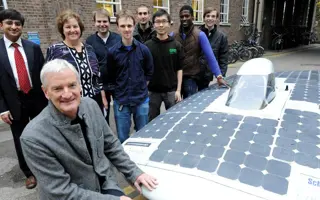News
James Dyson Foundation donates £8 million to Cambridge University
The James Dyson Foundation donated £8m to Cambridge University to create a technology hub at the heart of Cambridge.

Cambridge is the third oldest university in the world, and one of the most highly regarded. Many of the heroes of modern engineering have passed through its halls, from Charles Oatley, inventor of the scanning electron microscope, to Frank Whittle, who pioneered the turbojet engineering. But despite this prestigious engineering past, the university lacks a space for students to get hands-on with design-based projects.
The James Dyson Foundation donated £8m to Cambridge University to create a technology hub at the heart of Cambridge, providing the University of Cambridge’s brightest engineers with some of the world’s most advanced engineering laboratories. The donation is the largest gift ever received by Cambridge’s engineering faculty.
“Academic excellence is essential, but we need Britain’s brightest to turn powerful ideas into useful products. Real world problems will only be tackled by practical minds – and there are plenty of them to be solved!” - James Dyson.
Opened in 2015, the Dyson Engineering Design Centre contains a prototyping hub and workshop space for mechanical, structural and electronic engineers at the Department of Engineering. An open plan design featuring dozens of incubator units encourages the sharing of ideas and a collaborative research environment. And specialised printing machinery, scanners, lasers and routers help students get to grips with the realities of the design engineering.
Cambridge students won’t be the only ones to benefit from these world-class facilities. They’ll are also used for outreach projects, involving local schools in James Dyson Foundation engineering workshops to inspire the next generation of inventors. And the new Dyson Engineering Design Centre isn’t all the JDF is funding. A separate new 5 storey building, the James Dyson Building for Engineering, houses postgraduates and supports world leading research in areas including advanced materials, smart infrastructure, electric vehicles, and efficient internal combustion systems for cars. Bridge links across buildings allow easy access to testing laboratories housing world-class turbo machinery, fluid dynamics equipment and areas for nanotechnology analysis. Specialist knowledge on research strategies and funding advice are available on-site, supported by Philip Guildford Director of Research at the Department of Engineering.
“Our research is world class – but we have to bridge the gap between academia and industry”, says Dame Ann Dowling, Head of the Department of Engineering at the University of Cambridge, "The Dyson Engineering Design Centre and the James Dyson Building for Engineering will do that, supporting our emerging engineers and encouraging them to take risks and experiment.”
